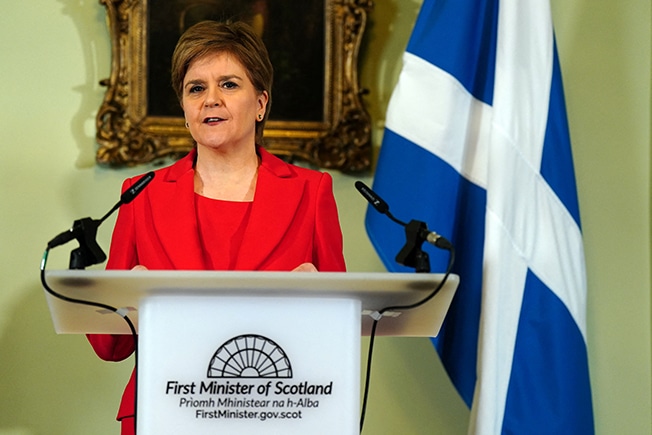Nicola Sturgeon quit as Scottish first minister on Wednesday, saying her dominance over her party and the country was no longer the asset it once was in the fight for an independent Scotland.
The 52-year-old, who has been first minister since 2014, also said she would stand down as leader of the ruling Scottish National Party (SNP), saying a fresh face would have a better chance of reaching across the political divide, and that she had become too divisive – and too tired – to lead that fight any more.
She will stay in place until a successor is found.
Sturgeon became SNP leader in the wake of a 2014 independence referendum when Scotland voted 55% to 45% to remain part of the United Kingdom.
But in recent months she has been outmanoeuvred by Prime Minister Rishi Sunak’s government in London over attempts to hold a second referendum and she has been embroiled in a row over transgender rights.
Sturgeon told a news conference in Edinburgh that while she believed there was majority support for independence in Scotland, the SNP needed to solidify and grow that support.
“To achieve that, we must reach across the divide in Scottish politics,” she said. “And my judgement now is that a new leader will be better able to do this. Someone about whom the mind of almost everyone in the country is not already made up for better or worse.
“I’ve always been of the belief that no one individual should be dominant in any system for too long.”
Sturgeon, who has had to work with five prime ministers in London during her time in office, stands down with no obvious successor, and with the matter of independence unresolved.
She led her party to a resounding success at the 2015 UK election, winning 56 of 59 seats in Scotland and establishing it as Britain’s third largest party, before she retained control over the devolved parliament at more recent elections.
Sturgeon’s SNP suffered a blow in November when the United Kingdom’s top court ruled that her Scottish government could not hold a second referendum without approval from the British parliament.
Successive Conservative governments in London have said the 2014 referendum was a once-in-a-generation decision and could not be repeated so soon.
Sturgeon said in response that she would turn the next British general election into a de facto referendum to ramp up pressure on London to grant another vote.
“There’s almost a vacuum that comes after her, because there’s nobody now who is a clear and obvious successor to take over,” Anthony Wells, Head of European Political and Social Research at YouGov UK, told Reuters.
He said Sturgeon’s strength at the top of the party had contained internal disputes over the way forward: “Without somebody clearly with her hand on the tiller, I guess it will be a bit chaotic.”
According to polls, support for independence rose above 50% in the wake of the Supreme Court defeat but has since slipped back.
In recent months, Sturgeon became embroiled in a row over transgender policies after Scotland passed a bill to make it easier for people to change their legal gender.
Sunak’s government said it would block the bill because it could impact the law in the rest of the United Kingdom.
But the row turned the spotlight on the treatment of transgender people in Scottish prisons, with Sturgeon facing difficult questions after a transgender woman convicted of rape was initially placed in an all-female prison.
Scotland has since said it would review the management of trans prisoners.

